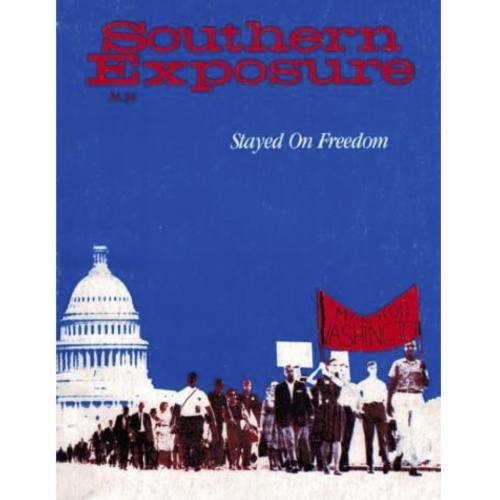Railroad Bill: The Black Robin Hood

This article originally appeared in Southern Exposure Vol. 9 No. 2, "Festival: Celebrating Southern Literature." Find more from that issue here.
In 1980, The Labor Theater of New York made the legend of Railroad Bill into a musical play which they now present around the country.
Somehow nobody can tell a story about Brewton without at least mentioning Railroad Bill. He didn’t have anything to do with courthouses or cats — unless you believe the tales they tell down in south Alabama about how Railroad Bill could change himself into a cur dog or a fox or a sheep or even a cat when the law got too close to him.
Railroad Bill started running from the law when he and a deputy sheriff had a misunderstanding about a Winchester rifle Bill owned, and Bill wounded the deputy with the gun. Bill caught a freight train to take him away from the place. Riding freight trains got to be a habit with Bill. So did stealing from them.
He’d break open a boxcar while the L&N freight train (Bill was partial to the L&N) was lickety-splitting along, and he’d throw out whatever struck his fancy. Then, later, he’d walk back along the tracks and collect his loot. Some of the stolen goods he used himself, some he sold and a lot he gave away.
Many black families living along the L&N tracks hardly ever had to buy canned food when they went to the store. They’d help Bill — tell him when the sheriff was getting close and let Bill sleep in front of their fire and such — and he’d see that they had something to eat.
Bill got so bold and so bad about stealing out of boxcars that the railroads put detectives on his trail, and every sheriff in south Alabama and northwest Florida was out to get him. Got so that a man didn’t stand a chance of getting elected sheriff if he didn’t make a solemn promise to catch Railroad Bill.
They all promised, but they didn’t catch him. Black folks said the law wouldn’t ever catch him because Railroad Bill was magic: he could turn himself into any kind of animal he wanted to any time he needed to. That’s what they said.
Bill could do tricks. He had traveled with a little three-monkeys-and-an-elephant circus for awhile, long enough to learn how to walk on his hands and to swallow an egg whole and cough it back up without even cracking the shell, and such as that.
When he heard that Sheriff Edward S. McMillan was after him, Bill knew he was going to need all his tricks. He wished Mr. Ed wouldn’t try to catch him, even wrote the sheriff a note and asked him not to come. “Please don’t come after me. I love you,” the note said.
But Sheriff McMillan didn’t pay any mind to that note. He went after Bill and hemmed him up, and Bill shot and killed the high sheriff of Escambia County.
Then Bill really had to run. But he kept on looting boxcars and spreading the loot around.
The sharecroppers and turpentine workers and the hands at the peckerwood sawmills talked about Railroad Bill and made up songs about him and laughed at the white folks thinking they could catch a trickster like Bill. Every time they heard about another one of Bill’s pranks, they added another verse to their songs.
“Ain’t nobody gonna catch that man!” they’d say. “Can’t kill Railroad Bill.”
Bill did get killed though, got shot dead before he had time to work his magic and change himself into an animal and run free.
The railroad officials and the law put Bill’s body on a train and took it all over south Alabama. The train stopped at every town so folks could come look at Railroad Bill’s body and see for themselves that he was really dead.*
The blacks came and they looked at the body laid out on the rough boards, but they knew Railroad Bill wasn’t dead. Not really. He couldn’t be dead, not him.
Years later, during the Great Depression, when the government was sending commodities to hungry folks to keep them from starving, some of the hungry folks down around Brewton just laughed and laughed. They knew the government didn’t send the food: Railroad Bill left it for them.
So that stray cat hanging around the railroad station in Brewton — it could be a direct descendant of one of those Pollard cats. It could be Railroad Bill.
* There is a recurring story that little Ed Leigh McMillan was taken down to the railroad station in Brewton to see the body of the man who killed his father. Ed Leigh, they say, picked a bitterweed blossom from a clump growing up through the chert along the tracks, and he put the yellow flower in Railroad Bill’s mouth. Only thing is, bitterweeds don’t bloom in March. That’s what comes of investigating a good story too closely.
Tags
Southern Exposure
Southern Exposure is a journal that was produced by the Institute for Southern Studies, publisher of Facing South, from 1973 until 2011. It covered a broad range of political and cultural issues in the region, with a special emphasis on investigative journalism and oral history.
